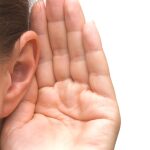- Nasal Endoscopy: After topical anesthetic and decongestant agents are sprayed in the nostrils, a small, fiberoptic camera is placed into your nose to better evaluate the anatomy of your nasal airway and decide if VivAer is right for you.
- Cottle Maneuver: This is a test to evaluate for nasal valve obstruction. Place two fingertips on each side of your nose and gently press and pull outward. A positive cottle sign is noted if there is improvement in your breathing when performed.
- NOSE Score: This is a brief questionnaire we have you fill out in the office to assess the severity of your nasal obstruction. It is performed at your consultation appointment as well as post procedure for comparison.
Author: mondik
Signs you need a Hearing Test this Year!
 Hearing loss is the 3rd most common health problem in the United States. It currently affects 36 million Americans per day. There can be several reasons for hearing loss such as illness, certain medications, infection, trauma, allergies, or part of the aging process. It can also affect people of all ages. If you’re experiencing any of the signs listed below, it’s important to be further evaluated to prevent any further hearing loss and be cared for.
Hearing loss is the 3rd most common health problem in the United States. It currently affects 36 million Americans per day. There can be several reasons for hearing loss such as illness, certain medications, infection, trauma, allergies, or part of the aging process. It can also affect people of all ages. If you’re experiencing any of the signs listed below, it’s important to be further evaluated to prevent any further hearing loss and be cared for.
- Sudden change in hearing. It’s important to get tested as soon as possible in this situation.
- Difficulty differentiating noises. You struggle to hear other people talk in noisy environments such as restaurants or group events.
- You feel like everyone else is mumbling. You only catch parts of words sometimes.
- You often ask others to repeat themselves.
- Ringing or buzzing in the ears (tinnitus). This can be in both ears or just one. It can come and go or always be there too.
- You find it hard to understand conversations over the phone or when someone isn’t facing you directly.
- You’ve been turning up the TV volume too much.
- Missing out on day-to-day sounds, such as cell phone ringing or the birds tweeting outside.
- If you experience Vertigo.
What’s the difference between Hearing Screening and a Hearing Test?
Hearing screenings are commonly confused with a formal hearing test, also called Audiograms. Hearing screenings are quick, basic tests that one either passes or fails. The patient wears headphones and signals when noises are heard. Audiograms, on the other hand, are completed by Audiologists. They use a variety of different tests to determine your ability to hear sound. The patient sits in an enclosed sound-proof booth to complete the test. Audiograms are painless and take about 10-15 minutes.
How often do I need my hearing tested?
This answer varies from person to person. Typically, we recommend baseline Audiograms starting at age 65 years old. Depending on the results, one may require testing annually or every other year to monitor progress or any changes. If there is any sign of infection, fluid in your ear, sudden change in hearing, an Audiogram is also indicated as soon as possible.
How can we help?
At Montgomery County Ent Institute, we offer formal Audiograms with specially trained and highly experienced Audiologists. The test takes 10-15 minutes and are reviewed afterwards with Dr. Melissa Schwartz or one of our Physician Assistants. In addition to reviewing Audiograms, we also thoroughly examine the outside and inside of your ears, nose, and throat for any other underlying causes.
Call Today to Schedule an Appointment.
5 Ways to Prevent Nosebleeds this Winter
 Fall is officially over and winter is here! With this change comes cold weather, chilly winds, and less humid air which means it’s the season of nosebleeds. Nosebleeds, also known as epistaxis, are most commonly caused by dry air. Nosebleeds occur when the blood vessels that line the inside of your nose break and bleed. Therefore, it’s important to keep the inside of your nose moist. Here are 5 helpful tips to prevent nosebleeds during this holiday season!
Fall is officially over and winter is here! With this change comes cold weather, chilly winds, and less humid air which means it’s the season of nosebleeds. Nosebleeds, also known as epistaxis, are most commonly caused by dry air. Nosebleeds occur when the blood vessels that line the inside of your nose break and bleed. Therefore, it’s important to keep the inside of your nose moist. Here are 5 helpful tips to prevent nosebleeds during this holiday season!
- Humidifier: Purchase a small humidifier to moisturize the air and your nasal membranes while you sleep. You can also use it during the day. Be sure to clean it regularly so mold and bacteria doesn’t grow.
- Saline nasal spray: Spray 2-3 squirts of saline spray in each nostril multiple times per day to keep the nasal mucosa moist. Examples of brands include Ocean™, Deep Sea™.
- Don’t pick your nose: Any picking or scratching of the nose can cause irritation to the mucosa and rupture a blood vessel, leading to a nosebleed. It could be helpful to trim your nails in case you accidentally scratch your nasal mucosa.
- Saline Gel: In addition to saline spray, nasal gels can also help keep your nasal mucosa moist. Examples of brands include Ayr™, Rhinase™
- Use nasal sprays correctly: Prescription nasal sprays can cause dryness when sprayed towards the septum (middle of the nose). This can increase your risk of nosebleeds. It’s important to use your right hand to spray in your left nostril and your left hand to spray in your right nostril.
Our office is always here to help! If you have any additional questions or concerns or if you are struggling to deal with nosebleeds this winter, call our office to schedule an appointment.
Practice Profiled in Suburban Life Magazine
Our practice was recently profiled in Suburban Life Magazine! Please click on the following link to see the article: montgomery-county-ent-institute-in-suburban-life-magazine
Additional Office Location
We are excited to announce that effective September 1st, 2016, the Montgomery ENT Institute will be merging with Dr. Sondra Saull’s office located in the Holy Redeemer Medical Office Building in Meadowbrook, PA. This union of teams will ensure the level of excellence in patient care that you have come to trust from both practices.
Both Dr. Schwartz and Dr. Ondik will continue to have hours at their Elkins Park office, but will now have additional hours at the new Holy Redeemer office. Dr. Saull will continue to see patients at the Holy Redeemer office.
Dr. Saull has been in practice for 30 years and is board certified in Otolaryngology, Head & Neck Surgery. She uses an integrative approach to the medical management of Ear, Nose and Throat conditions, and has a special interest in working with the older patient.
Dr. Schwartz founded the Montgomery County ENT Institute in 2007 to address a need for personalized and specialized care. With 20 years of experience, her passion for patient care has served patients of all ages in the Philadelphia region. She is board certified in Otolaryngology, Head & Neck Surgery and is a Fellow of the American Academy of Otolaryngic Allergy.
Dr. Ondik joined Montgomery County ENT Institute in 2014, and in addition to ENT care, is a double-board certified surgeon with a special interest in facial plastic and cosmetic surgery. He is board certified in Otolaryngology, Head & Neck Surgery and Facial Plastic and Reconstructive Surgery.
We look forward to continuing to serve our patients as the Montgomery County ENT Institute.
Sincerely,
Melissa Neumann Schwartz, DO FAOCO FAAOA
Sondra C. Saull, MD
Michael P. Ondik, MD
When To Worry About A Sore Throat
Sore throat
A sore throat is a fairly common complaint, and there are many causes from post-nasal drip to more serious causes, like infection or tumor. Otolaryngologists are doctors who specialize in ear, nose and throat disorders. They are able to conduct a thorough examination with special scopes to visualize the throat and voice box, and evaluate the cause of your sore throat.
Could it be from allergies? Or a cold?
Post-nasal drip is when excessive mucus produced in the nose drains down the throat causing irritation. Allergies or an upper respiratory infection like the common cold can lead to post-nasal drip. A post-nasal drip from allergies can be seasonal or year-round. Allergy testing is beneficial to help identify which allergens are triggering your symptoms. Topical nasal steroid sprays and/or antihistamines can be helpful. If your symptoms persist even on medications, you may benefit from allergy therapy with allergy shots, allergy drops placed under the tongue or allergy tablets.
Could there be an infection causing my sore throat?
An infection of the tonsils, known as tonsillitis, is a common cause of a sore throat which is usually severe in intensity. It comes on quickly and is often accompanied by fever, pain when swallowing and swollen lymph nodes in the neck. Pus is usually present on the tonsils when it is bacterial. ‘Strep throat’ refers to the name of the bacteria (Streptococcus) that causes a common bacterial tonsillitis. This kind of throat infection should be treated with antibiotics; however a viral infection of the tonsils does not require antibiotic therapy. Both types of infections usually resolve within 7-10 days. A tonsillectomy may be necessary for patients who experience multiple episodes of tonsillitis each year.
Could it be related to my diet?
Acid reflux, also known as Gastroesophageal Reflux (GER) or Laryngopharyngeal Reflux (LPR), can cause recurrent sore throats. This is when acid from the stomach travels up into the esophagus and around the voice box causing inflammation. Many notice the sore throat is worse in the morning just after waking up, and this is due to acid reflux occurring during the night while you are sleeping. Heartburn and indigestion are not always present with LPR, and this is known as ‘silent reflux.’ Other symptoms include a dry cough, a sensation of mucus in the throat, throat clearing, hoarseness, and difficulty swallowing. Antacid therapy, such as Tums, Pepcid, Prilosec (Omeprazole) are a few of the over-the-counter medications that can help alleviate the sore throat caused by reflux when taken over a few weeks. It is important to treat acid reflux because it is a risk factor for cancer of the esophagus. Lifestyle changes are also important to help eliminate this problem causing your sore throat. Caffeine, chocolate, alcohol, spicy food, peppermints, acidic fruit juices are common food triggers of acid reflux. It helps to elevate the head of the bed when sleeping and to avoid eating late at night. A pH probe is a useful test to help diagnose and determine the severity of acid reflux. It entails having a small, thin probe placed into the nose and throat which can detect if acid is reaching the back of your throat. You can still eat, drink, and sleep normally while having the pH probe in place. This is a useful test since many patients have acid reflux at night when they are sleeping so they are unaware it is occurring.
Is this a symptom of something more worrisome?
Sometimes a sore throat is from a malignancy, or tumor, in the head and neck. If you have a sore throat that persists longer than 1-2 weeks, you should schedule an appointment with a medical provider. Certain symptoms, such as difficulty swallowing, a change in your voice, unexplained weight loss, or a lump in the neck raise a red flag of something more worrisome causing your sore throat, and you should see a medical provider immediately.
Turn Down The Volume
All About Allergies
What are allergies?
Allergies occur when your body’s immune system overreacts to substances that either enter or come into contact with your body. The word allergy covers many topics, but when people are complaining about “allergies” they are probably talking about environmental allergies. Environmental allergies include substances like dust, dander and pollen. These substances cause irritation of the nose and eyes and create symptoms like post-nasal drip, nasal congestion, itchy or watery eyes, sneezing, wheezing, and coughing.
How do I know if I have allergies?
You may already suspect that you have allergies, but your doctor will need to ask questions about your symptoms and your exposures in order to help determine if you are truly allergic. Some people suffer from seasonal allergies and notice that they have a runny or stuffy nose at certain times of the year or after they have been exposed to a cat or dog. Other people may have year-around symptoms without any seasonal variation and many patients will have both types of allergy. After your physician discusses your symptoms and exposures they will usually perform an allergy test.
How is allergy testing done?
Allergy testing is usually done in one of two ways. Typically, your physician will order a “skin-prick” test that checks your body’s reactions to multiple allergic materials such as different pollens, cat dander, dust, etc. The test is well-tolerated by patients and takes about 45 minutes to do in the office. Alternatively, your physician may order a blood test. You doctor will help determine which type of test is best for you.
I was tested for allergies when I was a kid and told I wasn’t allergic.
Just because you may have been tested and shown not to have any allergies as a child doesn’t mean that you can’t develop allergies as an adult. Many patients develop allergies later in life.
What are food allergies?
Food allergies occur when your body reacts to any food such as peanuts, shellfish, milk or eggs. You may experience symptoms such as tingling or itching of the mouth, hives, nausea, wheezing, or even more severe reactions such as anaphylaxis.
There is also a condition called “Oral Allergy Syndrome” where patients with pollen allergies also have reactions to specific related foods. For example, someone with a ragweed allergy may have a reaction to bananas or melons. Symptoms are usually limited to an itchy mouth or throat but they could be more serious.
What do allergies have to do with asthma?
Both allergy and asthma are the result of your body’s overreaction to exposures in the environment. A typical allergy patient reacts by experiencing nasal and/or eye symptoms. An asthma patient reacts with wheezing, cough or difficulty breathing. Many patients will have both conditions to a greater or lesser degree. It is estimated that 70-90% of patients with asthma have nasal allergies and 40-50% of patients with nasal allergies have asthma. Uncontrolled allergies may worsen asthma symptoms. In fact, many asthma patients find that their breathing problems are better controlled when their allergy symptoms are treated. We treat both allergy and asthma together at our practice.
What treatments are available for allergies?
There are three main treatments for allergies. The first treatment is avoidance, and as you would expect, it means trying to keep away from the substances that produce an allergic reaction. Avoidance measures include removing carpets and upholstery (to eliminate dust mites), keeping your windows shut in the warm months, using air filters, and protective covers. The second type of treatment includes the use of special medications such as nasal sprays, oral antihistamines and other medications. The third line of treatment is immunotherapy. Immunotherapy (also known as “allergy shots”) is a technique where your doctor uses small doses of allergic material to help your body learn not to overreact. At our office we offer the traditional allergy shots as well as a newer technique called allergy drops. Allergy drops have the advantage of allowing you to administer the therapy yourself at home without the need for any injection.
Can allergies cause sinus and ear infections?
Allergies have the potential to lead to many other issues including sinus and ear problems. Your sinuses are connected to your nasal passage through very small openings. Allergies cause these openings to swell, leading to a build up of mucus and infection within the sinuses. Similarly, allergies can cause swelling and blockage of the eustachian tube that connects the nasal passage to the part of the ear. Blockage of this tube can lead to a feeling of pressure in the ear, a build up of fluid, or a middle ear infection.
What can I do if I suspect I have allergies?
The best course of action is to meet with one of our physicians or our physician assistant to have a detailed discussion about your symptoms followed by a thorough examination with possible allergy testing.
Understanding Your Allergies and Sinuses
Please join Dr. Michael Ondik on May 20th at 7pm for a patient seminar at the MossRehab Einstein Elkins Park at 60 Township Line Road, Elkins Park, PA 19027. The seminar will discuss treatment of allergies and sinus disease and offers patients an opportunity to learn more about their condition. The seminar will be in the G1 Conference Room. Please call our office at 215-887-7380 with any additional questions about the upcoming seminar.
